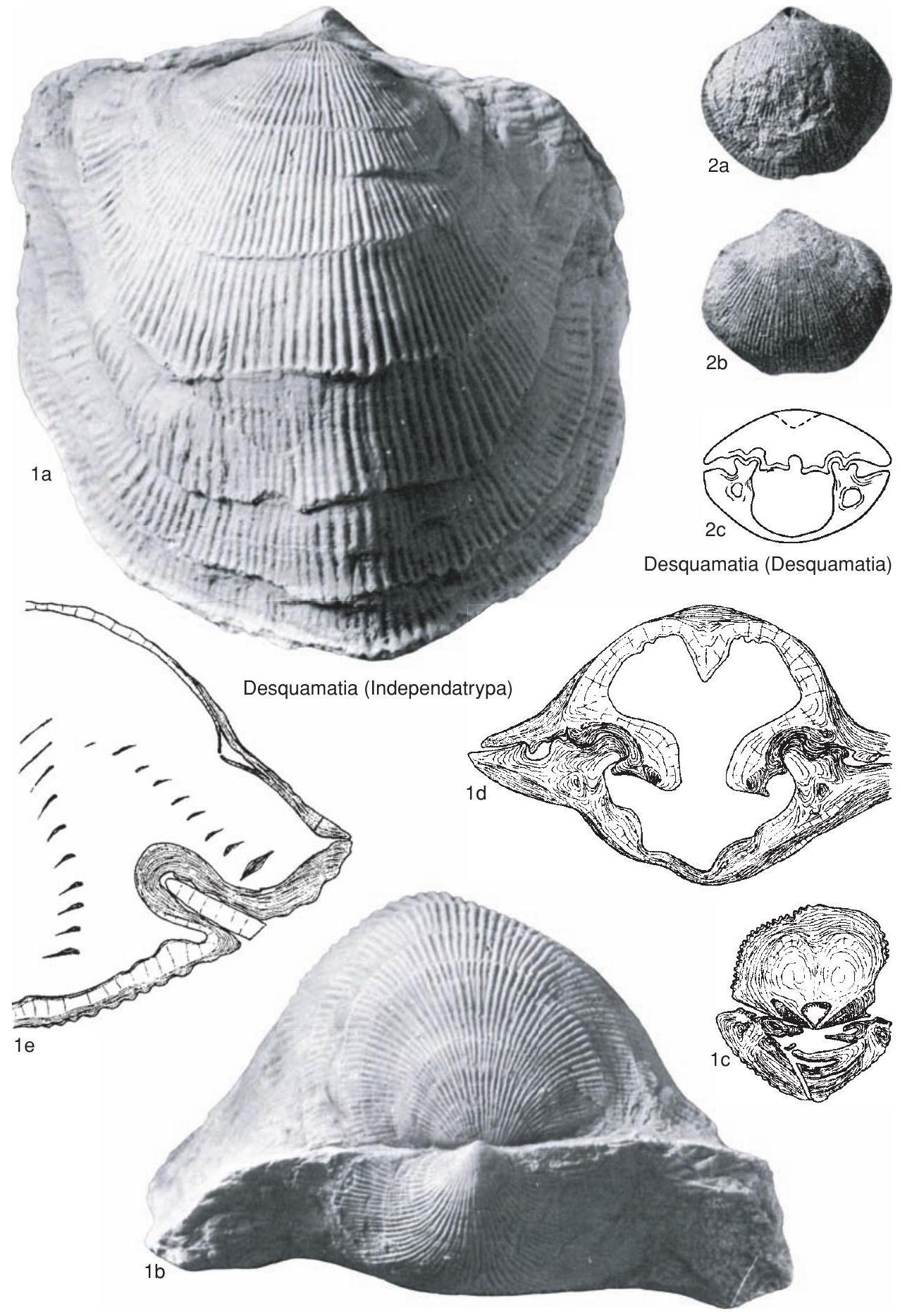Welcome to the Treatise on Invertebrate Paleontology!
Please enter a genera name to retrieve more information.

Desquamatia
Classification
Phylum:
Brachiopoda
Subphylum:
Rhynchonelliformea
Class:
Rhynchonellata
Order:
Atrypida
Suborder:
Atrypidina
Superfamily:
Atrypoidea
Family:
Atrypidae
Subfamily:
Variatrypinae
Formal Genus Name and Reference:
Desquamatia ALEKSEEVA, 1960a, p. 421
Type Species:
Atrypa (Desquamatia) khavae ALEKSEEVA, 1960a, p. 423, OD
Images
(Click to enlarge in a new window)
Fig. 959, 2a-c. *D. (D.) khavae (Alekseeva), lower Eifelian, eastern slopes, Urals, a-b, dorsal, ventral views, x1, c, serial section, x1.6 (Alekseeva, 1960a).
Synonyms
Cleiothyris, Desquamatia (Synatrypa), Carinatinella, Tenuiatrypa, Peshiatrypa
Geographic Distribution
worldwide
Age Range
Beginning Stage in Treatise Usage:
Lower Devonian (Pragian)
Beginning International Stage:
Pragian
Fraction Up In Beginning Stage:
0
Beginning Date:
412.4
Ending Stage in Treatise Usage:
Upper Devonian (Frasnian)
Ending International Stage:
Frasnian
Fraction Up In Ending Stage:
100
Ending Date:
371.1
Description
Small to large, ovoid to shield shaped, biconvex to dorsibiconvex; beak small to medium; orthocline-hypercline area; small, commonly obscured foramen; minute deltidial plates; ribs fine to medium, in some coarsening distally, interrupted by regular, concentric growth lamellae; frills short to wide, concentrated around commissure, rarely preserved; commissure weakly to strongly plicate; thin pedicle callist separated from deltidial plates; teeth with small to large dental cavities; hinge plate weak to strong; crura feathered; dorsal spiralia with up to 20 whorls; jugal processes terminating in hooklike jugal plates. [Distinguished from other variatrypinids by nature of growth lamellae and rib size.]
References
Museum or Author Information
Classification
Phylum:
Brachiopoda
Subphylum:
Rhynchonelliformea
Class:
Rhynchonellata
Order:
Atrypida
Suborder:
Atrypidina
Superfamily:
Atrypoidea
Family:
Atrypidae
Subfamily:
Variatrypinae
Formal Genus Name and Reference:
Desquamatia ALEKSEEVA, 1960a, p. 421
Type Species:
Atrypa (Desquamatia) khavae ALEKSEEVA, 1960a, p. 423, OD
Images
(Click to enlarge in a new window)
Fig. 959, 2a-c. *D. (D.) khavae (Alekseeva), lower Eifelian, eastern slopes, Urals, a-b, dorsal, ventral views, x1, c, serial section, x1.6 (Alekseeva, 1960a).
Synonyms
Cleiothyris, Desquamatia (Synatrypa), Carinatinella, Tenuiatrypa, Peshiatrypa
Geographic Distribution
worldwide
Age Range
Beginning Stage in Treatise Usage:
Lower Devonian (Pragian)
Beginning International Stage:
Pragian
Fraction Up In Beginning Stage:
0
Beginning Date:
412.4
Ending Stage in Treatise Usage:
Upper Devonian (Frasnian)
Ending International Stage:
Frasnian
Fraction Up In Ending Stage:
100
Ending Date:
371.1
Description
Small to large, ovoid to shield shaped, biconvex to dorsibiconvex; beak small to medium; orthocline-hypercline area; small, commonly obscured foramen; minute deltidial plates; ribs fine to medium, in some coarsening distally, interrupted by regular, concentric growth lamellae; frills short to wide, concentrated around commissure, rarely preserved; commissure weakly to strongly plicate; thin pedicle callist separated from deltidial plates; teeth with small to large dental cavities; hinge plate weak to strong; crura feathered; dorsal spiralia with up to 20 whorls; jugal processes terminating in hooklike jugal plates. [Distinguished from other variatrypinids by nature of growth lamellae and rib size.]
